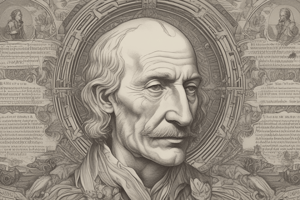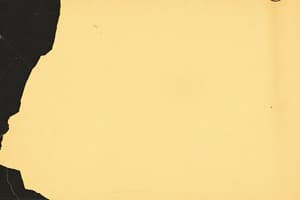Podcast
Questions and Answers
According to John Locke, how is the 'self' identified?
According to John Locke, how is the 'self' identified?
- Consciousness and continuity of memory (correct)
- Physical body and sensory perception
- Empirical evidence and rational thinking
- Sensory experiences and innate ideas
What is the main emphasis of Empiricism as explained by David Hume?
What is the main emphasis of Empiricism as explained by David Hume?
- Sense experience and innate ideas
- Consciousness and rational thinking
- Continuity of memory and sensory perception
- Role of experience and evidence in forming concepts (correct)
According to David Hume, what is the 'self' composed of?
According to David Hume, what is the 'self' composed of?
- Memory and continuity of identity
- A bundle of impressions from experience and sensation (correct)
- Innate ideas and rational thinking
- Consciousness and sensory perception
What concept did John Locke associate with the 'self' that provides continuity of experience over time?
What concept did John Locke associate with the 'self' that provides continuity of experience over time?
According to St. Augustine, what did he believe about the human being?
According to St. Augustine, what did he believe about the human being?
What did Rene Descartes conceive as the two distinct entities that make up the self?
What did Rene Descartes conceive as the two distinct entities that make up the self?
What was Plato's view on the nature of the self according to the text?
What was Plato's view on the nature of the self according to the text?
What did Rene Descartes consider to be the only thing that one cannot doubt?
What did Rene Descartes consider to be the only thing that one cannot doubt?
According to Socrates, what is the true task of a Philosopher?
According to Socrates, what is the true task of a Philosopher?
What did Plato believe about the composition of the soul?
What did Plato believe about the composition of the soul?
What did Philosophy originally mean to the Greeks?
What did Philosophy originally mean to the Greeks?
How did Merriam-Webster define self?
How did Merriam-Webster define self?
Freud's structural division of the psyche includes which of the following levels of consciousness?
Freud's structural division of the psyche includes which of the following levels of consciousness?
What was Gilbert Ryle's view on the concept of 'self'?
What was Gilbert Ryle's view on the concept of 'self'?
Paul Churchland's philosophy is based on which view?
Paul Churchland's philosophy is based on which view?
What was Freud's concept that operates according to the reality principle?
What was Freud's concept that operates according to the reality principle?
Study Notes
Philosophical Views on the Self
- According to John Locke, the 'self' is identified through consciousness and continuity of experience over time.
Empiricism and David Hume
- The main emphasis of Empiricism, as explained by David Hume, is that all knowledge comes from experience and observation.
- According to David Hume, the 'self' is composed of different perceptions or experiences that are bundled together.
John Locke's View on the Self
- John Locke associated the concept of personal identity with the 'self', which provides continuity of experience over time.
St. Augustine's View on Human Beings
- St. Augustine believed that human beings are rational and social, and that they have a tendency towards evil.
Rene Descartes' View on the Self
- Rene Descartes conceived the self as composed of two distinct entities: the mind (res cogitans) and the body (res extensa).
- Rene Descartes considered the only thing that one cannot doubt to be his own existence, expressed in the phrase "I think, therefore I am" (Cogito, ergo sum).
Plato's View on the Self
- According to the text, Plato believed that the self is immortal and exists before birth and after death.
Socrates and Philosophy
- According to Socrates, the true task of a philosopher is to seek wisdom and understanding.
Plato's View on the Soul
- Plato believed that the soul is composed of three parts: reason, spirit, and appetite.
Origins of Philosophy
- Philosophy originally meant "love of wisdom" to the Greeks.
Definition of Self
- According to Merriam-Webster, the self refers to the entire person of an individual, including their physical and psychological makeup.
Freud's Psychoanalysis
- Freud's structural division of the psyche includes the conscious, preconscious, and unconscious levels of consciousness.
- Freud's concept of the ego operates according to the reality principle.
Gilbert Ryle's View on the Self
- Gilbert Ryle rejected the idea of the self as a non-physical substance or entity.
Paul Churchland's Philosophy
- Paul Churchland's philosophy is based on eliminative materialism, which rejects the existence of non-physical mental states.
Studying That Suits You
Use AI to generate personalized quizzes and flashcards to suit your learning preferences.
Description
Test your knowledge of John Locke's philosophical views and his concept of 'Tabula rasa'. Explore the connection between the mind, body, and consciousness according to Locke's philosophy.




